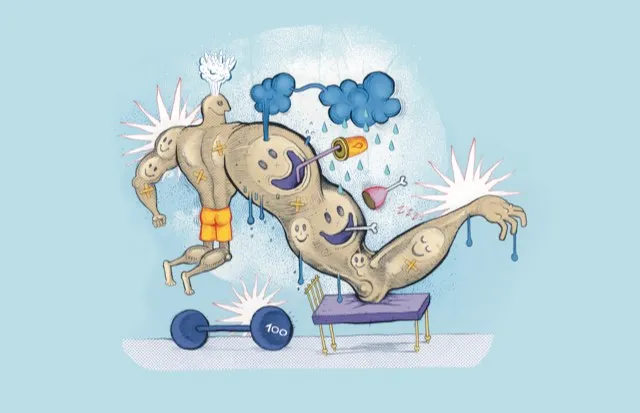How vital is it to allow recovery time?
Very. If you’re a recreational non-elite athlete and you train for seven days without taking a break, you could develop symptoms of overtraining, such as fatigue, soreness and immune system dysfunction. Taking at least one rest day over the course of the week is essential.
Pro athletes in a competition may not get a say in the amount of rest they can take. With the Rugby World Cup, for example, there’s a defined window during which the players will compete so this dictates the rest time they can take between games. Often the optimal rest versus the practicality of what they can actually take is different.
How much should I drink?
Weigh yourself before and after your workout. If you haven’t eaten or drunk anything while exercising, the difference will be the mass you have lost via sweating. It’s a good indicator of your hydration status.
A litre of water weighs one kilogram, so if you’ve lost a kilogram, you need to drink at least a litre of water.

What should I drink?
You often see people on the treadmill with calorie-laden commercial sports drinks. The problem is that they could be consuming more calories than they are expending by exercise.
If you are exercising for less than an hour then water is all you need. If, however, you are training for several hours at a time then you will be losing electrolytes in your sweat.
For every litre of sweat produced, you lose around one gram of sodium, so then it may be sensible to have a drink that contains some of these electrolytes.
What should I eat after a workout?
It’s a good idea to eat 20g to 40g of high-quality protein within an hour or so after a workout. High-quality proteins, like fish, eggs or dairy products, are essential for muscle protein synthesis, which is the process of building muscle mass during recovery.
Are protein drinks any good?
They’re no better or worse than eating a natural source of protein. They’re just more convenient.
I caution people from switching to them entirely because natural food offers many additional nutrients. It’s important not to replace your meal with shakes.
Read more from A scientist's guide to life:
- How to embrace boredom
- How to be a better conversationalist
- How to smell nice
- How to stay safe in the Sun
- How to master spring cleaning
- How to nail exam revision
- How to navigate digital living
Should I stretch after exercise?
We’ve all heard a trainer say that you need to stretch after exercise or be sore the next day, but there’s no evidence to back this up.
We can say pretty conclusively that stretching before, during or after exercise makes no difference to the soreness you experience.
Can supplements aid recovery?
We did a systematic review on this and found that both antioxidant supplements and natural antioxidants have no meaningful effect on soreness or performance after exercise.
The important take-home message is this. Extras like stretching, taking supplements or having an ice bath typically only infer between 1 per cent and 2 per cent of an advantage, if any at all.
‘The three Rs’: rest, rehydration and replenishment should make up 99 per cent of your recovery.
Follow Science Focus onTwitter,Facebook, Instagramand Flipboard
